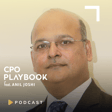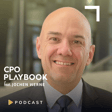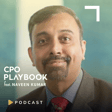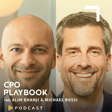Introduction to CPO Playbook Podcast
00:00:04
Speaker
Hello everyone. I'm Felicia Shakiba, and you're listening to the CPO Playbook Podcast. Join me and my guests as we feature insightful conversations with HR leaders, people scientists, and executives from diverse industries and functions, offering valuable perspectives on the future of work.
00:00:23
Speaker
Discover a unique outlook on navigating the complexities of the modern-day working world, exploring innovative strategies in talent management and corporate culture from the chief people officer's perspective. Tune in to stay ahead of the game when it comes to all things people related.
Leadership in Mergers & Acquisitions
00:00:44
Speaker
Welcome to a riveting episode where we reveal the enigmatic world of leadership and its profound impact on mergers and acquisitions. Today, we unravel the predicament of inadequate leadership and management capacity, a vexing issue that Robert Scherer suggests are contributing factors to the haunting 83% of merger deals that have left shareholder returns bereft of the anticipated boost, according to a study by KPMG.
00:01:13
Speaker
In this episode, we uncover the art of crafting an executive leadership team worthy of greater shareholder returns. The first strategy involves a meticulous assessment of skill gaps within the executive leadership team to create a blend of talents and expertise. The second approach centers on recruiting steadfast leaders with passion. The third focuses on cultivating leadership attitudes. And finally, the fourth centers around the alchemy of organizational culture.
Meet Mateo Tori, Tackling Food Waste
00:01:40
Speaker
Joining us from London,
00:01:41
Speaker
Mateo Tori is the chairman and founder of Latoon Holding, a pre-IPO company operating at the forefront of the global food waste epidemic. Mateo, thank you so much for being here. Thank you, Felicia. It's a pleasure to be here with you today. Mateo, what is Latoon technology?
00:02:06
Speaker
Letton Technology is a company I co-founded with some of my partners. The purpose of the business is really to utilize the latest possible ultrasound technology to make healthy profits in a circular economy.
00:02:22
Speaker
What is your role at Lettunen? What is your expertise? Lettunen, effectively, I'm the chairman and co-founder. So my expertise is really to shape the leadership of the business, to initially adapt different phases. The first phase is to start the business, then to execute, and then to make it successful. And then, so I'm likely to recruit a few leaders in the next few months.
CFO Responsibilities in M&As
00:02:47
Speaker
Mateo, as the chief financial officer and experienced professional in mergers and acquisitions, could you provide us with a glimpse into your unique perspective and responsibilities of these significant roles? Sure. In my capacity as a chief financial officer, I bear a multifaceted role that entails really an extensive array of responsibilities. My pervy extent to comprehensive financial oversight, including financial planning,
00:03:17
Speaker
analysis and risk management for the entire organization. Now within the realm of mergers and acquisitions my role takes on a heightened significance. I'm entrusted with the pivotal task to identify prospective opportunities. Then you have to orchestrate rigorous due diligence processes ensuring the financial face of the transaction harmonize
00:03:42
Speaker
seamlessly, really, with the overarching, strategically imperative organizations. So, I'll give
The Importance of Accurate Due Diligence
00:03:49
Speaker
you an example. In the case of Manigram acquisition, quite a few years ago, between business, due diligence and planning did not go as expected. And when Manigram embarked on the acquisition, they initially conducted a thorough due diligence process.
00:04:04
Speaker
examining the target company's financial records, operation and overall financial health. The objective was to ensure a smooth transition and to have an accurate understanding of the European business financial standing. However, during this due diligence process, unexpected issue arose. It was discovered that the balance sheet of the European business had been substantially overstated.
00:04:29
Speaker
This meant that the assets and liabilities of the target company had been misrepresented, leading to a significant discrepancy between the reporting financial health and the actual financial status. Now, the overstatement of the balance sheet as a serious implication for the acquisition, it meant that the financial foundation on which Manigram's initial planning
00:04:53
Speaker
and valuation had been based was fundamentally flawed. The discrepancy threatened the feasibility and success of the acquisition. The financial situation of the acquired company was not what Manigram had initially anticipated. In response to this unexpected revelation, Manigram had to substantially modify the planning, needed to reassess the deal's terms, adjust the valuation, determine the actual financials of the European business,
00:05:23
Speaker
Additional checks and investigations are to be contacted to accurately gauge the target companies' asset liabilities and overall financial stability. The situation underscores the importance of Faraday diligence
00:05:39
Speaker
and the need for flexibility in planning during complex business transactions such as acquisitions. The overstatement of the balance sheet forced Manigang to reevaluate their approach, highlighting the critical role of accurate financial data in making informed decisions and mitigating potential risk measures of acquisition.
00:06:00
Speaker
And inadequate leadership and management capacity have been identified as contributing factors to the failure of many merger deals.
Leadership Challenges in M&As
00:06:11
Speaker
In your experience, what are some common leadership challenges that you've observed in these situations?
00:06:17
Speaker
Generally speaking, even in normal business operation, leadership is an issue in itself. However, in the realm of mergers and acquisition, it's fraught with complexity and why recurring impedance often pertains to leadership and management inadequacies. So it's essentially to really underscore that the challenges associated with M&A encompass a multitude of phases.
00:06:46
Speaker
The fusion of leadership teams originated from distinct organizational culture is one issue, which compounded your problem really.
00:06:56
Speaker
often necessitating really a nuanced approach to ensure alignment and cohesion, so that makes it even more difficult. Furthermore, managing employee morale amidst the turbulence of change and uncertainty can prove to be, again, a significant challenge. To address these multifaceted challenges
00:07:18
Speaker
In my view, it's imperative to emphasize the criticality of effective communication. I will say high quality communication, the formulation of a shared vision, and I will say the cultivation of really very resolute leadership roles.
Identifying Skill Gaps in Leadership
00:07:35
Speaker
How do you approach identifying skill gaps within an executive leadership team and what steps do you take to ensure a harmonious blend of talents and expertise?
00:07:46
Speaker
Yes, the identification of skill gaps within an executive leadership team really entails a methodical and comprehensive assessment. This process really commences by conducting an exhaustive evaluation of the prevailing strengths and limitations of the existing team.
00:08:07
Speaker
Subsequently, the quest for complementary talents begins. It's vital to really put in place those mechanisms for clear and unambiguous communication while fostering an environment where mutual goals are firmly established. This is very important. Mutual goals, they need to be
00:08:25
Speaker
not only established but communicated. And these collaborative undertakings are pivotal in ensuring harmonious simulation of diverse talent and expertise, ultimately culminating in a robust and well-rounded leadership team. I'm just going to put some more stress to this subject. In any successful venture, whether it's approach of the company or an initiative,
00:08:52
Speaker
effective leadership is really, is the cornerstone of achievement. Leadership, however, is not the worst side of its whole concept, so it cannot be just described like in a book, really. It's a collaborative effort that thrives on the diversity of skills. For example, there's the value of the complementary leadership skills within a team that I know very well, specifically I liked in the roles of the
00:09:16
Speaker
three people. Why is the coordinator? The second one is the finisher. The third one is the creative visionary. That's the perfect team in my view. The coordinator, who's the coordinator? He's the back one of our team, ensuring that every part of the project or plan is seamlessly integrated.
00:09:34
Speaker
They are master organization, structure, delegation, keep us on track, they create roadmaps, make sure all the moving parts are working together efficiently. Without them would be lost in chaos. They are the navigators who provide direction.
00:09:51
Speaker
The finisher, the finisher is the one who ensures that nothing is left incomplete. They are meticulous, detail oriented, dedicated to returning plans into reality. They have a keen eye for quality, don't rest until every task is not just finished.
00:10:07
Speaker
but just finished to perfection, which sometimes could be questioned to be asked sometimes. The finisher's dedication is what transforms great ideas into tangible result. And then we go to creative visionary. Sometimes it's the dreamer of the team. This leader is the spark that ignites innovation and brings fresh perspective to the table. They are unafraid to think outside of the box, to challenge the status quo, and to inspire the team with really bold ideas.
00:10:36
Speaker
the creative visionary help us to adapt and evolve, ensuring that our endeavors remain relevant and forward-thinking, which is really important. What's really amazing is that these roles are not in opposition by in harmony. The coordinator's ability to organize complements the creative visionary penchant for ideation, the creative ideas really, the finisher's dedication ensure that the coordinator's plan are executed to perfection,
00:11:04
Speaker
together these roles created dynamic leadership ecosystem, I call it, where each skills enhance the others. So I think it's worth remembering, no road is more important than another in this type of steel leadership. We call it like that.
00:11:20
Speaker
We need all these skills working in tandem to achieve our goals. Our diversity should be our strength for all of us, and this one makes our team exceptional. So as we continue to work together, we always appreciate the unique qualities each of us bring to the table, and so be honest this power of complementary leadership skills to reach new levels, new heights. I think it's important to all the stress on the need for diversity and for the integration of different skills.
00:11:49
Speaker
I actually really loved what you said about all of those pieces. I think that brings a lot of things into perspective. So I think all of those different types of leaders provide an extremely well-rounded leadership team, especially in a
00:12:05
Speaker
or entrepreneurial environment. So when you think about enlisting stalwart leaders with unwavering passion is one of your strategies for building a successful executive leadership team.
Cultivating Passion in Leadership
00:12:19
Speaker
Can you share an example of a leader you've brought on board who exemplified this passion and the impact they had on the organization? First of all, I'd like to say the cultivation of essential leadership aptitudes is
00:12:32
Speaker
I would call it foundational to engendering a culture of inspiration and innovation. In the context of leadership, these entities encompass a spectrum of qualities like adaptability, resilience, empathy, a fervent commitment to a growth mindset. So let me just give you an example of a leader who is taking these attitudes, accepting a readiness to embrace change,
00:12:59
Speaker
I would call it truly known and unwavering resilience when confronting challenges and also very empathetic and supportive approach to team dynamics. I'm just going to give you an example of the cooperation I worked for a few years ago. It was a traditional hierarchical organization, the manufacturing sector with a culture that prioritized efficiency and cost cutting above all else. So the company had a stagnant growth rate and was experiencing decline in shareholder value.
00:13:26
Speaker
you to increase competition and market changes the leadership recognize the need for a cultural transformation for that to the evolving business landscape so the ceo john desire to lead the transmission of change in vision the culture shift the prioritize innovation employee empowerment.
00:13:44
Speaker
and a customer-centric approach. John believed that this new culture would enable the company to respond more quickly to market changes and improve customer satisfaction, thereby, obviously, that's the consequence of boosting shareholder value. A cultural transformation. Now, to bring about this cultural shift, John and the executive team effectively implemented several key initiatives.
00:14:10
Speaker
in already three big things. Open communication is the first one. They forced the open communication channel to encourage employees to share ideas and feedback. Regular town hall meetings, suggestion boxes were introduced. The second one was employee development. So the business invested in employee training, development programs, encouraging employees to take ownership of their career growth.
00:14:35
Speaker
The third one was a customer-centric approach. Now, this was integrated in all aspects of the business with departments working collaboratively to improve the customer experience. Positive impact. So employee engagement with the new culture, employees felt more engaged and empowered. They became more creative and proactive, leading to a surge in innovative ideas and increased productivity.
00:15:02
Speaker
The company could now quickly adapt to market changes leading to the development of new products and services that met customer needs. This allowed the business to gain a competitive edge and then customer satisfaction as the organization obviously became more customer centric.
00:15:20
Speaker
The customer satisfaction improved significantly, and the business started to wane back customers and attracting new ones as well. shareholder values is almost like a consequence. Over a few years, those changes positively impacted the organization's financial performance.
00:15:36
Speaker
In turn, both stations with value, the company price increased due to improved financial results, and it became more attractive to investors as well. So what's the conclusion here? The transformational change in this business culture, driven by visionary leadership, profound positive impact, an employee engagement, adaptability, and a customer-centric approach
00:15:59
Speaker
led to increased financial performance and ultimately improved shareholder value. In my view, this example demonstrates how cultural transformation can be a catalyst for a positive change in a business.
00:16:12
Speaker
How can a strong executive leadership team together contribute to improved financial performance through culture? Okay, I will say this, that in this particular situation, I mean, this is what I personally, this is my opinion, an instance where a transformative shift in organizational culture really
00:16:32
Speaker
bolster performance and in actual the value is eminently. This transformation was effectively, I would say, anchored in a strategic focus on inclusivity and diversity, which to me the two big drivers for performers as well.
00:16:50
Speaker
and for obviously the overall culture of the business. The organization leader espoused a commitment to fostering an inclusive environment with a broad spectrum of perspectives and voices and the result was a surge in creativity, the generation of lots and lots of new innovative ideas.
00:17:10
Speaker
Now this transformation gave tangible through it in the form of height and innovation as superior performance. I would say as a lateral effect, there was unequivocal announcement to show the value of blood as an actual consequence. The merger and acquisition landscape. This can be highly complex and challenging.
Culture Shifts for Financial Performance
00:17:33
Speaker
How do you ensure that leadership roles in merged companies work cohesively to achieve the common objectives?
00:17:42
Speaker
This is a very complicated, what I'll say is the amalgamation, that's the right word, of the robust executive leadership team functions as a potent catalyst for augmenting financial performance, but through cultural influences. So by collectively formulating a shared vision and shared values as well.
00:18:08
Speaker
such things can really, I was saying, could create a neatness of accountability, excellence,
00:18:17
Speaker
share objectives, yeah, throughout the inter-organization. So everyone really thrives on this culture, really, and leadership that leads by example, multiply this, propagates a culture of stranger accountability, and say, I would call it, relentlessly strive for excellence, as intrinsically poised to motivate a broader organization cohort.
00:18:39
Speaker
Sometimes there's some confusion between generosity and excellence. Actually, a leader who creates another leader is an excellent leader, as sometimes we would be generous. No, it's an excellent leader. I would just stress on that. And this motivational impetus is pivotal in really fostering a
00:19:00
Speaker
a collaborative spirit. Ultimately, the objective is to steer the organization towards enhanced financial success. And it's well understood that in a merger situation, in a change situation, the difficulty is multiplied by many times compared to a normal situation.
00:19:19
Speaker
What advice would you give to entrepreneurs looking to build their executive leadership team from scratch to ensure that they have the right blend of skills and attitudes?
Advice on Building Diverse Leadership Teams
00:19:29
Speaker
Yeah, I mean, entrepreneurs, they tend to be a very lonely figures in our society because society doesn't understand the incredible contribution they're giving to us by creating jobs, by creating wealth. But the entrepreneurs themselves need more education on
00:19:48
Speaker
how they can improve their own wealth so for entrepreneurs embarking on the end of constructing an executive leadership team from the ground up the imperatives are really manifold the foremost consideration is really what i would call it
00:20:06
Speaker
an orchestration of the blend of skills, competency and attitudes. This, again, I would call it amalgamation, is the bedrock upon which a leadership team's effectiveness eventually rested. An imperative to place an emphasis on the cultivation of a diverse and complementary array of skills. So additionally, the implementation of attitudes, encompassing, I would say, adaptability, definitely passion,
00:20:33
Speaker
resilience all these are instrumental really and these activities should be really carefully aligned with the the overarching vision and values of the company really so and ultimately that will position the team as a potent Japan for organizational growth
00:20:54
Speaker
And again, I will say this is where there is a world of extra education that entrepreneurs deserve to receive when they take the risk of creating a new business. They create the risk, risking their money, really. And then and by doing that, they create jobs, they create what we see in the economy.
00:21:14
Speaker
I have one follow-up question for you. You talked about the different types of skill sets that are critical, like the different types of roles that are critical for leadership executive team to thrive. How important is it to have someone on the executive team in a people-focused role like a chief people officer? When does that become critical to have that executive at that level?
00:21:40
Speaker
It's always critical, I would say. Really, when you go for organizational growth, often you find complexities.
00:21:49
Speaker
related to skill in operation and a strategic imperative of venture into new markets really. So what I was saying before, the adaptation and the diversity of the team requires really a very careful management from the Yoma resource standpoint.
00:22:10
Speaker
team has to have a diversity in the skill of the player. It's a bit like any sport you play. In a sport you have the people are very good at finishing score a goal, you've got the people are very good at defending from an attack.
00:22:25
Speaker
usually finance stands on the defense, the operation department stands on the sort of midfield, and the commercial team stays on the forefront, trying to score goal opportunities. Even within those teams, those departments, there's a need for diversity of skills, diversity of inclination. You want to act, those people are very good, as I was saying before, they're very good at coordinating,
00:22:55
Speaker
But you want to have those people who are very creative as well, who can really create that spark that will let everyone else play better, for example. And on the other hand, you need somebody really focused on finishing. So that does require very strong human resource management. The more the business grows, the more it becomes complex, obviously, the more it requires
00:23:20
Speaker
that strategic people management approach. And I would say this, any entrepreneur wants to be successful and wants to really create wealth.
00:23:33
Speaker
they will do it through one of the key goal of the business in my view, which is succession planning. Without succession planning, the business has very limited value without a good succession planning. With succession planning, the business will generate value because it will not depend on one person or two people or three people. It will depend on a collection of people who are together working for the same goal.
00:24:00
Speaker
So yeah, Abu Dola is strongly advised any entrepreneur that moment they decided they want to exit the business, they want to obviously, you know, take profits. What I've done, succession planning is one key goal that takes a long time to achieve. So it needs to start very early in the business journey. Mateo, thank you for your time, your expertise. Your advice is incredibly valuable. And thank you for being here.
00:24:29
Speaker
Thank you, Felicia. It was a pleasure to be here tonight. That's Mateo Tori, the chairman and founder of Latoon Holding in London.
00:24:41
Speaker
If you like today's podcast, we have more podcasts on innovative HR strategies, talent management, organizational culture, and more, and how to navigate the complexities of modern day HR. Find them at CPOplaybook.com slash podcasts or search CPO Playbook on Apple podcasts, Spotify, or wherever you listen. Thanks for listening to the CPO Playbook podcast. We'll be back with a new episode next time.
00:25:12
Speaker
I'm Felicia Shakiba.
00:25:33
Speaker
And if you have an idea you would like us to talk about or a guest you'd like to nominate, visit cpoplaybook.com slash contact us to suggest an idea.




















